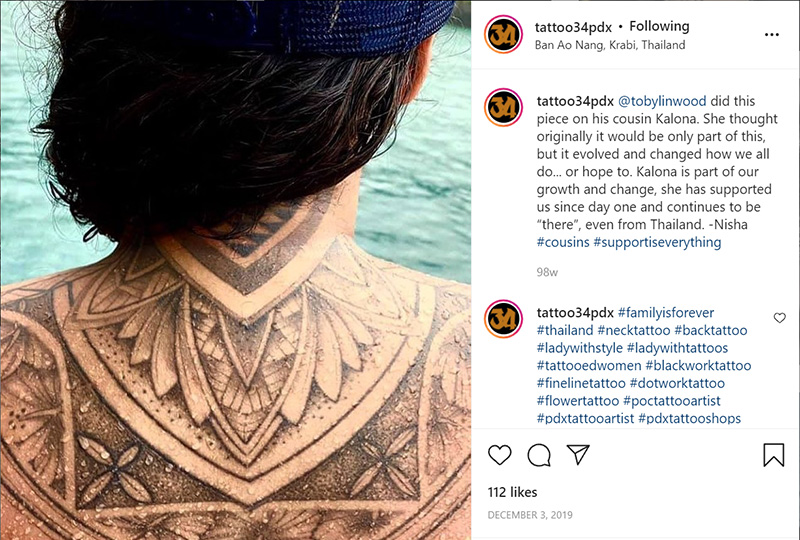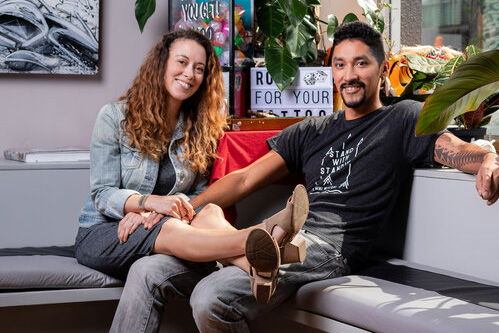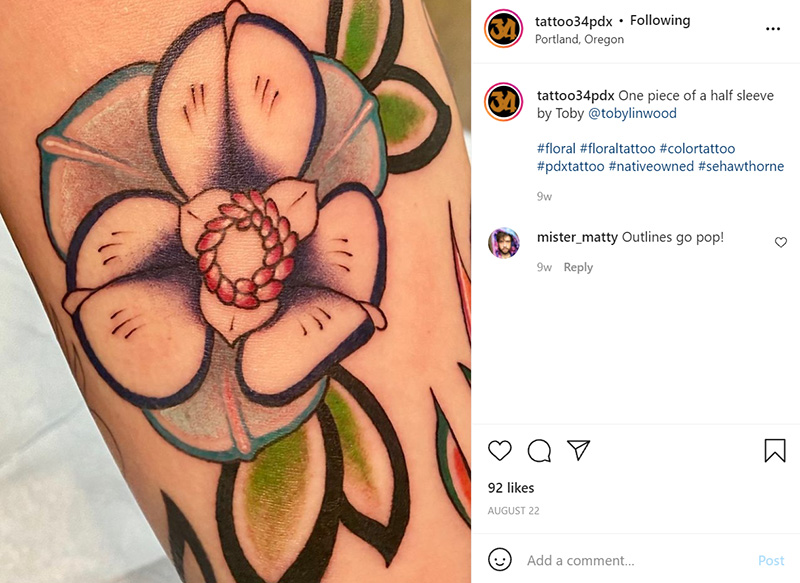Pivot.
A Portland, Oregon tattoo shop finds its way through crisis – and a new business model emerges.
Tattoo 34
ICIC Program:
Inner City Capital Connections (ICCC)
The COVID-19 pandemic and the ensuing shutdowns changed every business, but personal services business, such as tattoo parlors, were devastated.
Nisha Supahan, an Indigenous person raised in the Karuk tribe of California, and her husband, Toby Linwood, who is Black and Native American, bought their first tattoo shop, Hawthorne Ink, in Portland, Oregon in 2016. Toby was an artist there and when the owners decided to retire, he and Nisha took the leap into becoming business owners.
That first year, Nisha and Toby struggled as the business brought in just $2,000 in revenue over expenses. In December 2016, they renovated the space and launched a complete rebrand, including a website, and renamed the shop Tattoo 34. The number “34” had great significance to the couple as Toby’s first business was called Three Fourths Designs, he was 34 years old, and the shop was originally located at Hawthorne and 34th Street.
The business built slowly and steadily as their client base grew, but walk-ins were a large part of their revenue. In 2019, Nisha was helping run the shop part-time while she was a full-time caregiver for her grandmother. After her grandmother passed, she decided to give it a shot to run the business full-time, grow it, and make it the sole source of income for their growing family, which includes three children.
Nisha began taking business classes through a community organization and was assigned a business adviser. In 2020, the adviser referred her to Inner City Capital Connections (ICCC) and she was accepted into the program. The timing was crucial as the pandemic was in full swing and Tattoo 34 was shut down for months.
“I needed to get back to connecting with other people and businesses,” she explains. “I felt like I was treading water rather than getting anywhere. Having another way to get back into that mindset of business and growth was good.”

GIVING BACK
Over the past three years (2019-2021), Tattoo 34 and its artists have donated more than $22,000 in cash, gift cards or volunteer time. Tattoo 34 also created a fund to help BIPOC artists get into the tattoo industry in Oregon.

Survival mode
They received grants that helped them stay afloat and she attended ICCC’s Portland virtual seminar in October 2020. The big question Tattoo 34 – like all personal services businesses – faced was how to pivot? How do you go from a business model that depends on human-to-human interaction to one without any?
“Going through the program, it helped refocus where my brain was,” Nisha says of her ICCC experience. “I felt like I was in survival mode that whole time. There were other business owners and a whole network, so hearing the speakers and talking to other people, it kind of refocuses your mindset.”
“It doesn’t matter what the business is,” she continued. “It’s hearing the experiences and knowing you’re not alone. It is very powerful.”
They were closed completely for four months with no revenue coming in. When they partially opened in the fall of 2020, COVID restrictions cut their volume drastically and required them to book by appointment only. They set up an online appointment system and an e-commerce section on the website to sell merchandise, which created some new revenue.
As restrictions relaxed, they found that clients making appointments were getting more intricate tattoos. Where a walk-in client might spend $100 on a small tattoo that takes an hour, appointment clients were coming in for several hours and spending hundreds of dollars. Many spent a great deal of time planning their body art with Toby and the other artists and made multiple appointments to complete large pieces.
Pre-pandemic, the shop saw an average of 200 clients per month. That number has decreased to 125-150 a month, but revenue has increased as clients are spending more on pieces.
“The kinds of clients we’re attracting has changed very much. And the kinds of tattoos are different. Clients now are coming in and getting larger, more involved pieces,” Nisha explains. “Our business structure, the whole way we operate has changed and it’s completely from the pandemic. We’ve had to change everything.”
“The kinds of clients we’re attracting has changed very much. And the kinds of tattoos are different. Clients now are coming in and getting larger, more involved pieces. Our business structure, the whole way we operate has changed and it’s completely from the pandemic. We’ve had to change everything.”
DIVERSITY, EQUITY, AND INCLUSION
Tattoo 34 is the only Indigenous- and Black-owned tattoo shop in Portland, Oregon and the first and only tattoo shop certified as a Minority Business Enterprise (MBE) and a Women Business Enterprise (WBE) in Oregon.
Community first
As an Indigenous- and Black-owned business, Tattoo 34’s ethos has always centered around community betterment, celebrating diversity, promoting inclusion and supporting their neighbors. The shop is a true community center for all as activists, philanthropists, artists, small business owners and others regularly gather and collaborate with Nisha, Toby and their team.
They host fundraisers for a variety of causes – from addiction to human trafficking to raising awareness about missing and murdered Indigenous women. They also donate to youth programs and host career days for aspiring young artists.
“We’re a community-based tattoo shop that values community and youth,” she says. “We support BIPOC artists who are trying to become tattoo artists. There’s a lack of representation in the industry and we want to help change that.”
On the home front, the pandemic also changed their lifestyle. Nisha and Toby combined households with another family, creating an extended family that included another couple and five more children who moved up to Portland from the Karuk reservation in California to live with them. Sharing housing costs and resources helped both families financially throughout the pandemic, while also creating their own little pandemic bubble.
“Combining households seemed like the best idea,” Nisha says. “We made our own village.”
The future for Tattoo 34 – once bleak due to COVID shutdowns – is now brighter than ever. Nisha and Toby recently bought a commercial building and moved the shop. Owning the building will help them build equity, wealth, and stability, give them more control over costs and allow them to utilize the space more freely. And they’re growing. They now have seven artists, with more on the way. “We got knocked out and now we’re building back up,” Nisha said.
